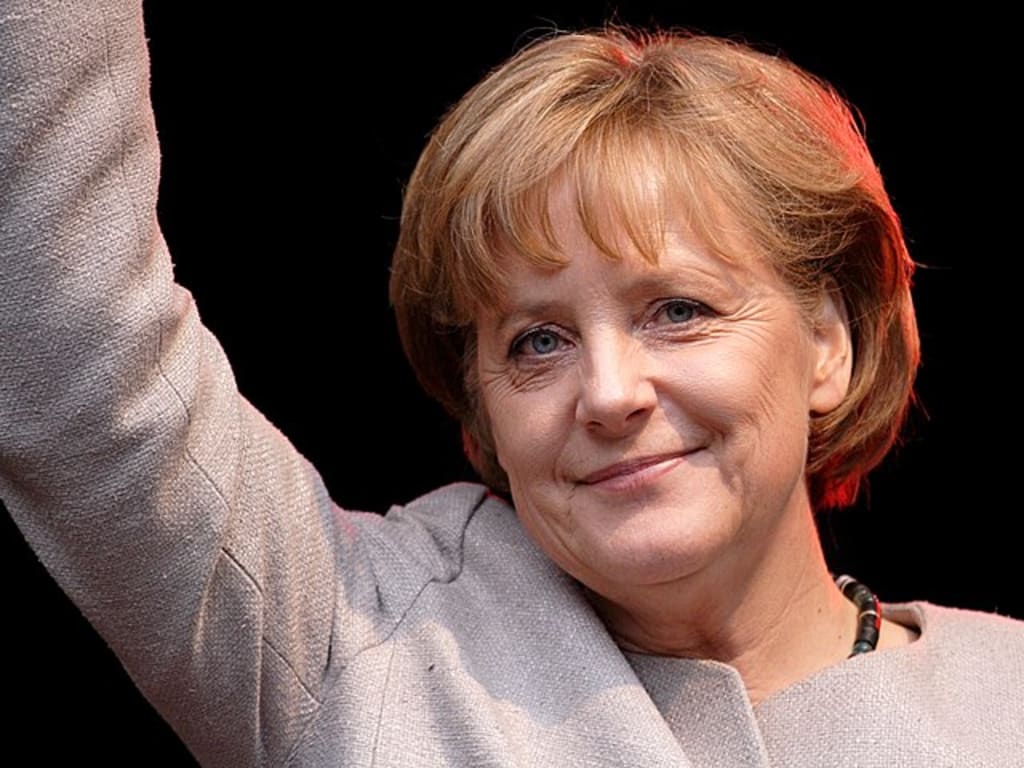Is Angela Merkel The Greatest German Chancellor Ever?
A brief assessment of German leaders.

In the coming weeks, the curtains will be drawn on the one of the longest serving and competent democratically elected leaders in the world. Angela Merkel, who has spent the last 16 years being Chancellor of Germany will step aside for a successor, who undoubtedly will have very big shoes to fill.
As the leading economic powerhouse in Europe, Germany has never been short of strong leaders. It was on the watch of the Otto Von Bismarck that Germany became Unified in 1871, fighting a series of wars with France, Austria and Denmark, winning on all fronts and claiming for itself, territories from each of the three vanquished nation states. Allied to these victories, Bismarck was able to consolidate his country's position at the heart of the continent, much to the chagrin of Great Britain.
Even when after it lost the first world war and had to pay large reparations to the allies, there were intellectuals and economists who thought that leaning hard on Germany was a very bad idea; This thinking was pervasive among the German people. The subsequent collapse of the Weimar Republic and the resulting hyperinflation made it easy for the third Reich to take over the reins of power.
The destruction wrought by the loss of the second world war and the need to carry out a denazification of West Germany (by now, Eastern Germany was under the control of the soviets) called for a highly strategic and forward thinking leader; One who could lead his or her country out of the wilderness and restore the country to international respectability, while resuscitating its economy.
Enter Konrad Adenauer.
Aided by American funding through the Marshall plan, Herr Adenauer set about expunging all vestiges of national socialist ideology in West German society.
To kick start its economic recovery, the post-war chancellor set about embracing and adopting elements of laissez-faire capitalism, which gave rise to the Wirtschaftswunder, which means German economic miracle in English. So stunning was its growth that by the early 1960s, West Germany had outgrown and outpaced its nemesis in the second world war - Great Britain.
According to a British journalist who went to see things for himself in the 1960s, David Eversley had the following to say:
As real incomes rose, so public authorities were enabled (and indeed encouraged) to raise funds, both from taxation and through borrowing, to accelerate the rate of investment and current spending in projects which are partly immediately productive, partly conducive to the creation of the good life, as seen in Germany … Any superficial examination of the German townscape, let alone perusal of the statistics, shows that Germany has spent sums on hospitals, libraries, theaters, schools, parks, railway-stations, socially-aided housing, underground railways, airports, museums, and so on which are simply not to be compared with British efforts in this direction.
---
By the time Herr Adenauer left office at the age of 87 in 1963, he had bequeathed a robust economy and a nation which had moved on from the yoke of National Socialism.
Ludwig Erward and Kurt Georg kisenger barely register in our consciousness owing to the short periods spent in office. It is fair to state that they continued the policies of their highly illustrious predecessor.
Willy Brandt was undone by the espionage scandal which revealed that one of his assistants was a spy for the East German state. Given the closeness between Gustav Guillaume and his boss, Brandt's position was no longer tenable and he had to fall on his sword.
Helmut Schmidt was largely unpopular for his anti-Israel outlook and his reluctance to address his nation's anti-Semitic past, which is extraordinary, given that he served in the third Reich and his biological father was born to a Jewish gentleman.
Herr Schmidt's removal following the collapse of the coalition government gave rise to one of the most iconic world leaders of the late twentieth century - Helmut Kohl.
Herr Kohl's time at the helm of his nation's affairs is marked by a number of achievements which had profound global ramifications:
· The Creation of the European Union
· The Establishing of the European Rate Mechanism, which was a precursor to the Euro Currency
· The ending of the cold war
· The reunification of East and West Germany
· The resolution of the Bosnian war
The European Union in its current format, as a bulwark against the rise of China, Russia and the emerging economies of Brazil and South Africa, owes a great deal to the extraordinary perspicacious leadership of Helmut Kohl.
In contrast to the view held by the German press, which presented the larger than life Kohl as lacking in charisma, intellect and sophistication, Bill Clinton, in a book written by Taylor Branch said Herr Kohl was by far the smartest leader that he dealt with in his time as President of the United States.
Herr Kohl's successor - Gerhard Schroeder's time in power was marked by phasing out nuclear power, funding renewable energy, instituting civil union for same sex partners. The expansion of the EU to accommodate the likes of Poland, Bulgaria, Romania, Latvia, Czech Republic took place during his time in power.
His Blarite policies didn't endear him very much to the public but his Chancellorship was most notable for its opposition to the war in Iraq in 2003.
The unraveling of his coalition in late 2005 led to the rise of Germany's first female Chancellor in its entire history.
Angela Merkel
Unlike her male predecessors, Angela Merkel grew up under a military dictatorship in East Germany, during the age of communism. It is no exaggeration too say that her world view was shaped by the events of the cold war.
It is also fair to point out that her pro science outlook has been shaped by the fact that she has a PhD in Quantum Chemistry and worked as a researcher until 1989.
In the aftermath of the collapse of the Berlin wall in 1989, Ms Merkel moved into politics, rejecting the communism of her youth for capitalism. Under Helmut Kohl's mentorship, her political ascent began. Her gender and origins - being female and East German - counted in her favour. But it wasn't long before she undertook a number of important ministerial jobs.
Her ruthlessness and cunning were sharpened in the years when her party was out of favour, brought about by the illegal donations that Helmut Kohl had accepted as Chancellor.
Her maneuverings led to her election as party leader and ultimately the first female Chancellor of Germany.
Under her leadership, Ms. Merkel played an outsized role in ensuring that Europe's economies didn't fall apart during the global crash of 2008–9. Her rescue of the Greek, Italian, Irish and Portuguese economies with stringent fiscal terms and conditions will be studied in universities across the world for a very long time to come.
On her watch, Britain's departure from Europe was carefully managed without the toxicity spreading to other nation states.
Her clear-sightedness came into sharp focus during the pandemic of 2020–1.
At a time of profoundly inadequate political leadership from her male colleagues across the world, Merkel has been the only grown up in the room, working to ensure that the spread of the deadly virus was effectively curtailed and European member states got the necessary vaccines to kick start their economies.
We also cannot forget her migrant friendly policies, which saw a large number of refugees given a new home in Germany.
Her critics may say that the last four years have been directionless; that Ms. Merkel wields power for power's sake, but when you read through the achievements of the previous paragraph, It certainly no hyperbole to say that Germany becoming a much more liberal society and the wider world owes a great deal to Ms Merkel.
---
Having gone through Germany's political leadership since the 19th century, it has more than produced its fair share of exceptional characters. In a crowded field, it suffices to say that Ms Merkel has shone quite brightly.
But as regarding the greatest ever Chancellor, those whose memories are long enough will plumb for Konrad Adenauer and for younger students like me might go for Merkel or Helmut Kohl.
It all depends on where your political sympathies lie.
It is a question of perspective.
About the Creator
Adebayo Adeniran
A lifelong bibliophile, who seeks to unleash his energy on a number of subjects






Comments
There are no comments for this story
Be the first to respond and start the conversation.